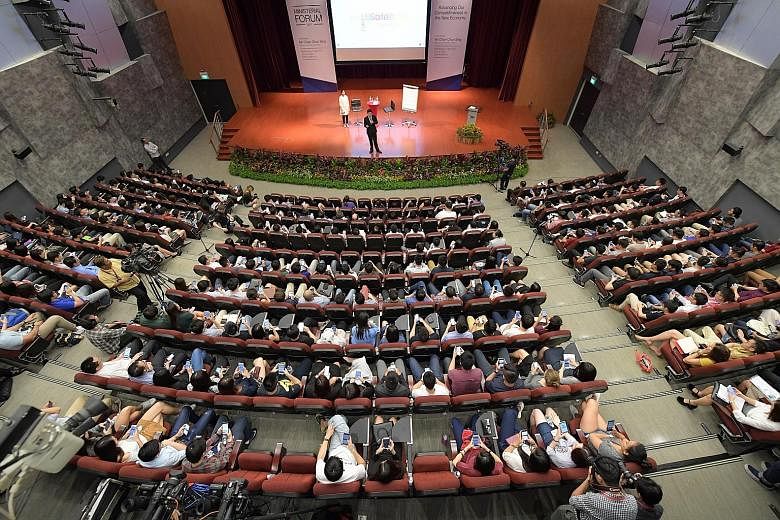Minister Chan Chun Sing last night set students a challenge: Get out of their comfort zone and pursue something that is not narrowly tied to their academic subject.
A broad range of knowledge and interests will help them stay ahead in the new economy, where adaptability and versatility are key.
Indeed, in an interactive poll that Mr Chan did during the dialogue at Nanyang Technological University (NTU), many among the 400 students felt adaptability was the most important skill they would get from university to face future challenges.
Adaptability, said the Minister in the Prime Minister's Office and labour chief, will be the most important trait that Singaporeans must have to survive in an evolving economy shaped by technological advancements and changing business models.
"If you can adapt, you won't lose out," he added.
But he is also concerned that one thing that holds people back from being adaptable is complacency.
Mr Chan noted that unlike the pioneer generation, Singaporeans today have far more choices, thanks to better education and a greater amount of resources. But, he said: "Will choices make us complacent? If it does, then we will not do even as well as our forefathers."
He urged students to be "worldly wise, and know what is happening beyond your books", saying this will give them the edge that many employers are looking for.
He cited his own experience as an undergraduate in Cambridge University, where he majored in economics, but also read biology and philosophy in his spare time.
"All that gave me a broad base to cross-pollinate ideas. Did it help me with my exam? Not much," he said.
He cited the example of Israel, which has been dubbed a "start-up nation" for its prowess in innovation and knack for adaptability.
Where most armed forces train with a set of drills, its defence force exposes officers to a variety of situations, because the threat they face is continually evolving, he noted.
And instead of learning drills for one particular response, there are many data points to adapt to, because the one that evolves fastest is the one that survives.
Likewise, Israeli parents do not ask their children what answers they gave in school, but what questions they asked. Mr Chan said: "If we get the questions right, we will get the answers. But if we have the answers, and the questions are wrong, we are completely irrelevant."
In reply to a student's question on how one can serve the community in a changing economy, he told the students that they - and those who are successful - have a duty to take care of the less well-off in society.
"Remember that it is not enough to be successful individually," he said. "Your success is also because of the support of your families. When you remember that, you give back something, you lend your shoulders (for others) to stand taller and see farther... Then, we have every confidence Singapore will also be successful."
Mr Chan noted that slower growth today poses a challenge to many societies, especially where wages of those in the middle stagnate.
One concern is when those who are better off start questioning the need to support the broad middle too, he said.
So far, the Government has managed its Budget carefully and built up its reserves, but to ensure that each generation does not burden the next, the workforce must think bigger than just the country and be "globally competitive", he said.
Mr Chan is optimistic on this front. Noting that many multinationals set up shop here not just to run a local operation, but also a regional or global headquarters, he said: "We have to ask ourselves if we have the multi-cultural skillsets to run those operations, and to get the top job."
"We need to compete in high- growth sectors. You have every chance to be successful," he added.
"We have to keep evolving and learning from the rest of the world, build our own unique business model, products and services... and we will get there."


